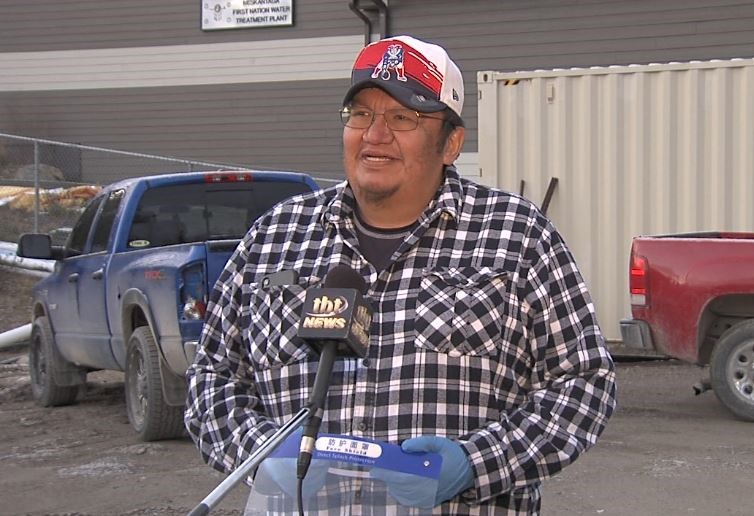THUNDER BAY — Dozens of residents of Neskantaga First Nation, 400 kilometres north of Thunder Bay, have arrived in the city after the community's leaders declared an emergency over concerns about the water supply.
Tests are being conducted to determine the cause of an oily sheen that developed on the surface of the water in the reservoir at the First Nation's treatment plant a few days ago.
Results are now expected back from the lab by Thursday evening.
The problem resulted in the shutdown of the water system, leaving residents to rely on bottled water for drinking, and no water for bathing or flushing toilets.
The school and community services are closed.
Chief Chris Moonias said nearly 60 residents were already in Thunder Bay on Wednesday morning.
Another 120 more were expected to be flown to the city throughout the day.
"We were trying to limit it to the most vulnerable people, but there are people who are asking to come out. People are crying. They can't live with this anymore," Moonias said.
Neskantaga already had Canada's longest-standing boil water advisory, spanning 25 years.
In September 2019, 200 residents were evacuated to Thunder Bay after water pumps in the new treatment plant failed.
Moonias initially said on Wednesday that lab results weren't expected to be returned for 10 days.
"I informed the community this wasn't acceptable. It's a health emergency. We are told to boil water. What water are we going to boil ? There's no water coming into the houses."
Sol Mamawka, the NDP MPP for Kiiwetinoong, said losing water to the entire community during COVID-19 is "a disaster" that puts the lives of residents at risk.
Moonias was expected to arrive in Thunder Bay late in the day to oversee the provision of services to Neskantaga residents while they stay in hotels.
He and Nishnawbe Aski Nation Grand Chief Alvin Fiddler issued a joint call for a coordinated response to the state of emergency.
Fiddler said community members are living in "dehumanizing condition," but there is currently no government support for the evacuation.
After participating in a call Wednesday with senior officials from Indigenous Services Canada, he said they refused to acknowledge the severity of the situation and classify it as a public health crisis.
Fiddler said he then wrote Prime Minister Justin Trudeau urging that he intervene immediately.
He noted that although the water treatment plant was constructed in 2016, there have been numerous delays, equipment failures and related infrastructure failures since then.
"The system failed in 2019, and the longstanding boil water advisory was replaced with a Do Not Consume warning," Fiddler said, adding that the federal government also refused to evacuate the community in that instance.
Federal government will cover evacuation costs
Late Wednesday, Indigenous Services announced it will cover the cost of the current evacuation.
In a statement, it also said it has "redoubled" efforts to address the water quality and water volume issues the First Nation has identified, and to complete the necessary work on the water plant.
The department said the construction of the water plant is still "in its final stages," and that upgrades to the waste water plant are also underway.
In the meantime, it said, it continues to provide funding for bottled water.
Indigenous Services said it is working directly with Neskantaga's leadership and with NAN and Matawa First Nations Management to mitigate the situation and ensure the community has the necessary supports.
This includes working with Ontario to ensure seamless access to health services including mental health, and that appropriate precautions are taken to safeguard evacuees from the risk of infection by COVID-19.
